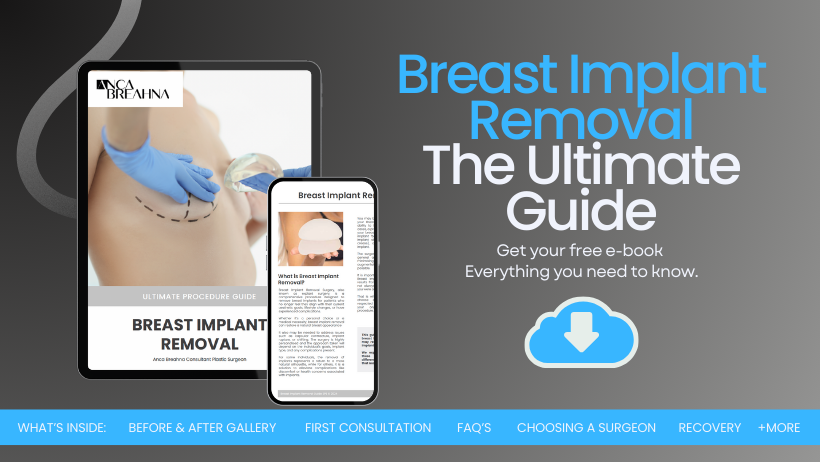
A Guide to Recovery after Breast Implant Removal Surgery
Making the choice to have your breast implants removed is a significant step. It may come after months or even years of thought, and it’s often accompanied by mixed emotions, ranging from relief to apprehension. Whether your reasons are personal, health-related, or due to a complication, it’s a decision that demands careful consideration and solid understanding of the road to recovery that lies ahead.
The reasons for opting for breast implant removal, medically known as explantation, can be as varied as the individuals making the choice. Some of you might be experiencing discomfort or health issues, known as breast implant illness, while others are facing complications such as a rupture, leakage, or capsular contracture, where scar tissue painfully tightens around the implant. For others, it’s a personal preference, perhaps a desire to change your appearance or a lifestyle choice.
Recovery after breast implant removal surgery plays an essential role in how you heal, both physically and mentally. It is an active process that requires your full participation. From following your plastic surgeon’s instructions, taking care of the surgical site, managing pain, and slowly getting back to your daily activities, each step is a move towards your wellness and comfort.
Anca Breahna, PhD, MSc, FEBOPRAS, FRCS (Plast) is a distinguished Consultant Plastic Surgeon with expertise in Aesthetic and Reconstructive Plastic Surgery. She stands out as one of the few female Plastic Surgeons in her region, bringing a uniquely female perspective to her practice, characterised by empathy, meticulous attention to detail, and personalised care.
Download Anca Breahna’s Breast Implant Removal Guide

Understanding Breast Implant Removal
Breast implant removal surgery, often referred to as explantation, is the process of taking out implants previously placed in your breast area. This procedure isn’t merely about removing the implant itself; it often involves additional steps to address the skin and natural breast tissue, ensuring they adjust to the alteration in volume. Depending on the individual case and Anca’s assessment, this might also include procedures to deal with the scar tissue capsule that forms around the implant, aiming to restore a more natural aesthetic and feel.
When it comes to the surgical approach, not all explantation procedures are the same. Anca will suggest the best method based on several factors including your health, the type of implants, and the reason for removal.
- Total Capsulectomy: A total capsulectomy involves removing the breast implant along with the entire scar tissue capsule that surrounds it. This is often recommended if there’s concern about infection or the presence of silicone material leakage
- En Bloc Removal: This technique is more complex, where the implant and the surrounding scar tissue capsule are removed together, without separating them, to avoid contamination of the body from the contents within the capsule. It was originally preferred in cases of ruptured silicone implants or suspected breast implant illness, however, current evidence shows that the risks of bleeding and injury to surrounding tissues far outweigh the benefits, hence it is recommended only in cases of capsular malignancy (https://www.isaps.org/articles/isaps-blog/2023/patient-safety-advisory/)
- Partial Capsulectomy: Partial capsulectomy, as the name suggests, involves the removal of the implant and only part of the scar tissue capsule. This might be suggested for various reasons, such as avoiding damage to surrounding tissues, especially if the capsule is closely adhered to the rib cage or lung
- Breast Implant Revision: This is not a removal but rather a replacement. If you’re experiencing complications but still want to have implants, you might opt for a breast implant revision. This involves replacing the old implants with new ones and is often combined with one of the above procedures to deal with scar tissue
The Recovery Process after Breast Implant Removal
Recovery is not a uniform experience; it varies for each individual. However, some common milestones and guidelines can provide some predictability and comfort as you heal.
The First 72 Hours Post-Operation
The initial days after your surgery are fundamental in setting the tone for your recovery period. Here’s what you can typically expect during this time.
- What to expect immediately after surgery: pain, discomfort, drainage, etc. Upon waking from the anaesthesia, you might feel groggy, tired, and experience pain or discomfort in the chest area. It’s also common to see some swelling and bruising. You have surgical drains to remove excess fluid, and understanding how to safely manage these is important. Rest is essential at this stage, and it’s important to follow the medical team’s advice on how to position yourself comfortably
- Wound care and monitoring: You’ll be given specific instructions on how to care for your surgical incisions. This often includes guidance on cleaning, what kind of dressings to use, and how often to change them. It’s important to monitor your wounds for any signs of infection, such as unusual redness, warmth, or an unpleasant odour, and report these to your medical team immediately
- Medication management: pain relief, antibiotics, etc. Managing pain and preventing infection are key concerns in the first few days. You’ll likely be prescribed medications for pain relief and possibly antibiotics. It’s important to take these as directed, understanding that managing pain is easier than trying to ‘catch up’ with it
The First Few Weeks
As you move past the initial post-operative stage, your focus will shift towards managing your daily activities and monitoring your healing progress.
- Follow-up appointments and ongoing wound care: You’ll have follow-up appointments with Anca to check your healing progress. These visits are opportunities to address any concerns and ensure everything is healing as expected. Continuing to care for your wounds, keeping the incisions clean, and following your plastic surgeon’s guidance on dressing changes is essential
- Recognising and managing potential complications: While recovering, you need to be vigilant for any signs of complications, such as increasing pain, swelling, redness, or discharge at the incision sites, as these could indicate an infection or other issues. Unexpected symptoms like shortness of breath or chest pain should prompt immediate medical attention at your local A&E
- Physical restrictions and activity modifications: You’ll need to avoid strenuous activities, particularly those that involve the upper body. Anca will provide guidance on when you can start to reintroduce activities and any movements you should avoid to prevent strain on your incisions and chest
- Nutritional guidelines to promote healing: Eating a balanced diet can aid your recovery. Focus on foods rich in protein, vitamins, and minerals, which promote healing. Stay hydrated, and consider discussing with Anca whether any supplements could support your recovery
Long-Term Recovery
Recovery continues well after the initial weeks post-surgery, with additional considerations to ensure a healthy and comfortable outcome.
- Scar management and care: Scars will go through a maturation process that can take several months to a year. Techniques such as massage, silicone sheets, or topical treatments can improve their appearance, but it’s important to wait until your incisions are fully healed before starting scar therapy
- Physical rehabilitation: safe exercises, regaining strength, etc.: Gradually reintroducing exercise is important for your overall health. Start with gentle activities like walking, slowly building up to more vigorous exercise over time as advised by your plastic surgeon. Consider consulting with a physiotherapist or personal trainer experienced in post-surgical recovery
- Adjusting to new body image: Adapting to your new appearance is an emotional process and takes time. Some individuals feel relieved and happy, while others need time to accept their new body shape. Remember, there is no ‘right’ way to feel
- Ongoing mental health support: Continuing to engage with supportive friends, family, or professionals is important. Whether you’re dealing with feelings around your surgery, concerns about your appearance, or anxiety about any health issues, ongoing support can be invaluable
FAQs about Recovery after Breast Implant Removal
How long is the recovery period after breast implant removal?
- The initial recovery phase lasts a few weeks, during which you might experience swelling, bruising, and discomfort. The complete healing process, including internal healing and scar maturation, can take several months to a year. It’s important to follow your plastic surgeon’s advice and attend all follow-up appointments to ensure a smooth recovery.
Will I need additional surgeries after implant removal?
- Some women choose to undergo additional procedures, such as a breast uplift or fat transfer, to address changes in shape or volume after implant removal. This decision is personal, depends on your desired outcome, and should be discussed with Anca, who can guide you through your options based on your individual circumstances.
What are the risks associated with breast implant removal?
- As with any surgery, there are potential risks involved. These can include infection, bleeding, anaesthesia complications, changes in breast sensation, and dissatisfaction with the aesthetic outcome. By following the pre-and post-operative instructions of your plastic surgeon, you can help minimise these risks.
How will my breasts look after the implants are removed?
- The appearance of your breasts after implant removal can vary based on several factors, including the size of the implants, the duration you had them, your skin’s elasticity, and overall breast composition. Some women experience significant changes in size and shape, including sagging or loss of volume, while others notice less dramatic changes.
Can removing breast implants alleviate symptoms of ‘Breast Implant Illness’?
- Some women report a range of symptoms they associate with ‘Breast Implant Illness’ (BII), though this is not yet fully recognised as a medical condition. Symptoms described include fatigue, cognitive issues, joint pain, and others. Many individuals indicate symptom relief after implant removal; however, experiences vary, and researchers are still investigating the relationship between implants and these reported symptoms. It’s important to discuss any health changes or concerns with Anca to determine the appropriate course of action.
Further Reading about Breast Procedures with Consultant Plastic Surgeon Anca Breahna
- Read more about Solutions for Saggy Breasts
- Read more about Solutions for Uneven Breasts
- Read more about Breast Uplift – Mastopexy
- Read more about Breast Implant Removal and Uplift
- Read more about Excess Skin after Weight Loss – Causes and Solutions
- Read more about Causes and Treatments for Capsular Contracture
- Read more about Glamorous Breasts with Large Breast Implants
- Read more about Plastic Surgery Recovery Information
- Read more about What can be done to Minimise Breast Implant Removal Scars?
- Read more about Preparing for Breast Implant Removal Surgery
- Read more about When Can I Exercise after Breast Implant Removal Surgery?
- Read more about Removal and Replacement of PIP Breast Implants
- Read more about Breast Implant Illness
Medical References about Breast Implant Removal
- Indications of implant removal: A study of 83 cases – NCBI
- Removal of orthopaedic implants: indications, outcome and economic implications – NCBI
- Breast Implant Removal: What to Expect, Surgery & Recovery – Cleveland Clinic
- Breast Implant Safety – WebMD
- Breast Implant Removal – American Society of Plastic Surgeons
- https://www.isaps.org/articles/isaps-blog/2023/patient-safety-advisory/


 Ms Anca Breahna, PhD, MSc, FEBOPRAS, FRCS (Plast) is a highly regarded Consultant Plastic Surgeon specialising in the field of Aesthetic and Reconstructive Plastic Surgery. Anca performs a range of
Ms Anca Breahna, PhD, MSc, FEBOPRAS, FRCS (Plast) is a highly regarded Consultant Plastic Surgeon specialising in the field of Aesthetic and Reconstructive Plastic Surgery. Anca performs a range of 